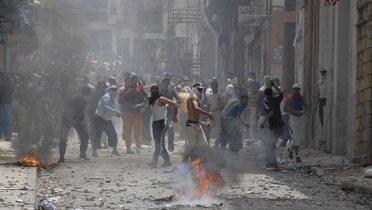Content from the Brookings Doha Center is now archived. In September 2021, after 14 years of impactful partnership, Brookings and the Brookings Doha Center announced that they were ending their affiliation. The Brookings Doha Center is now the Middle East Council on Global Affairs, a separate public policy institution based in Qatar.
EXECUTIVE SUMMARY
After the attacks of September 11, 2001, a growing number of analysts and policymakers drew a link between the dramatic rise of terrorism in the Middle East and the region’s lack of democracy. The question of whether levels of political rights and freedoms affect the resort to violence continues to be a source of major political debate.
While some scholars insist that democracies are less likely to produce terrorist activity, due to their ability to channel grievance peacefully, others contend that regimes transitioning to democracy are highly vulnerable to destabilization. Periods of liberalization often raise citizens’ expectations for freedom that regimes are unwilling or unable to meet. The resulting dissonance can fuel violent opposition.
This study examines whether liberalizing regimes in the Maghreb are more or less vulnerable to the threat of political violence and terrorism than their more repressive counterparts. Do political reform processes, however limited and incomplete, boost regime legitimacy and undercut support for radical opposition forces?
Over the last decade, the Maghreb has become a major producer and exporter of violent extremists to Afghanistan, Iraq, and Europe. This paper investigates whether political liberalization efforts in Algeria and Morocco, including the incorporation of mainstream Islamist groups, have contributed to a rise or decline in the level of political violence. Tunisia, one of the Arab world’s most authoritarian states, is also examined to determine whether more exclusionary state policies prevent violence or instead facilitate radicalization. The three cases suggest that the greater the gap between expected change and actual change, the greater the likelihood of political unrest and violence.
In Morocco, reform efforts seem to have enhanced the monarchy’s legitimacy and eased social and economic pressures on the population. However, the danger remains that political reforms have so far lagged behind the country’s socio-economic modernization. Algeria and Tunisia face similar problems, but to a greater degree since the regimes there lack the historical and religious legitimacy of the Moroccan monarchy. In all cases, social development tends to weaken traditional structures yet fails to present institutional substitutes that are able to meet people’s growing demands. Citizens are left without effective and responsive government institutions through which to address their grievances.
This paper argues that the potential negative impacts of liberalization processes on stability stem not from the depth of political and economic reforms but rather from their limited and inconsistent nature. This unevenness is, in some sense, inevitable. It is extremely difficult for political institutions in authoritarian contexts to keep pace with popular demands. As a result, most Arab societies find themselves torn between what they are and what many expect them to become. This gap cannot be easily erased. But it can be managed.
The Brookings Institution is committed to quality, independence, and impact.
We are supported by a diverse array of funders. In line with our values and policies, each Brookings publication represents the sole views of its author(s).




